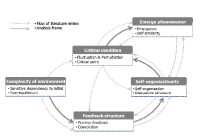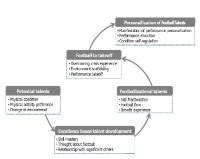
Purpose This study was aimed at interpreting the football talent development stages based on complexity theory. Methods The data for this study was gathered through literature review and in-depth interviews that were analyzed by thematic analysis. Literature review of the studies regarding complexity theory revealed the features of complexity theory and five football players participating in the K-league were interviewed. Gathered materials were analyzed by the thematic analysis. Initial codes and potential themes of football talent development stages, the conception and potential themes of the complexity theory were interpreted by metaphorical analysis. Results Results of literature review were as follows: analysis frame of complexity theory were organized environment of complexity, feedback structure, self-organization, critical condition and emergent phenomenon. The football talent development stages, interpreted as a result of literature review, were divided into Potential Talents, Excellence based Talents Development, Footballizational Talents, Football to Takeoff and Personalization of Football Talents. The stages were specifically materialized as follows: Potential Talents was materialized into physical condition, physical activity preference and change of environment. Excellence based Talent Development was materialized into skill mastery, thoughts about football and relationship with significant others. Footballizational Talents was materilized into skill fractionation, football flow and growth experience. Football to Takeoff was materialized into overcoming crisis experience, performance scaffolding and performance takeoff. Personalization of Football Talents was materialized into manifestation of performance personalization, performance evolution, condition maintenance. Conclusion Football talent development stages, interpreted by means of complexity theory, were divided into Potential Talents stage, Excellence based Talent Development stage, Footballizational Talents stage, Football to Takeoff stage and Personalization of Football Talents stage. Utilization of this study as a fundamental resource of football talents development programs and as a means to understanding football talents development is looked forward to.


PURPOSE This study aimed to extract football coaches’ categories of performance evaluation factors (PEF) and examine the reflective characteristics of the football coaches’ player and casting judgments. METHODS PEF were extracted through an open-ended questionnaire and categorization from 80 AFC C or higher football coaches. Reflection was calculated in player and casting judgments through an analytic hierarchy process. The difference between the football coaches’ player and casting judgments was examined using SPSS 21.0. RESULTS First, the PEF of football coaches were categorized into four general categories: physical intelligence, psychological intelligence, growth potential, and competition intelligence. Second, the importance of football coaches’ player judgments were reflected by the PEF as football intelligence, situation judgment, football talent, tactical understanding, tactical operation, etc. The importance of the casting judgment were reflected by the PEF as tactical understanding, mediative skills, fitness, tactical operation, situation judgment, etc. Third, a statistically significant difference was noted between player and casting judgments. Football coaches tended to value growth potential and talent as sub-factors in the player evaluations. Football coaches’ PEF were aligned with the importance of player and casting judgments in psychological and competition intelligence as sub-factors such as skills, physical, attitude, passion, etc., but differed from physical intelligence and growth potential as sub-factors including mediative skills, physical, football talent, and tactical understanding. CONCLUSIONS In the football coaches’ player evaluations, the idealistic principle centered on growth potential. However, in the casting evaluation, the realistic principle centered on victory takes effect.